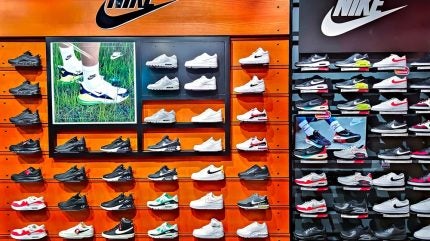
NIKE and Inditex were the only clothing companies that stood out among the world’s leading supply chain organisations in Gartner’s 20th edition of its Global Supply Chain Top 25 ranking, for their ability to prioritise sustainability and growth in a “challenging operating environment.”
Sportswear giant Nike secured 14th position in the ranking with a composite score of 3.50 while the Spanish fast-fashion conglomerate behind brands including Zara and Pull & Bear Inditex secured the 18th spot, with a score of 3.15.
The Global Supply Chain Top 25 list evaluates and ranks the supply chain capabilities of companies across various industries. This year’s ranking methodology takes into account a set of criteria, including peer opinions, financial metrics such as revenue growth and inventory turns, and a strong emphasis on environmental, social, and governance (ESG) in supply chain operations.
“The supply chain organisations in this year’s Top 25 were notable for better-protecting growth rates in a challenging operating environment, while at the same time delivering more sustainable operations,” said Simon Bailey, VP analyst with the Gartner Supply Chain practice.
“The best supply chains now have ESG criteria firmly embedded in their operations, while delivering higher than average growth rates, better returns on physical assets (ROPA) and stronger margins.”
Nike and Inditex embraced three trends in 2024:
- Attracting and engaging talent
Both retailers are said to have recognised the critical importance of attracting and retaining top talent to drive high performance and engagement within their supply chain organisations.
How well do you really know your competitors?
Access the most comprehensive Company Profiles on the market, powered by GlobalData. Save hours of research. Gain competitive edge.

Thank you!
Your download email will arrive shortly
Not ready to buy yet? Download a free sample
We are confident about the unique quality of our Company Profiles. However, we want you to make the most beneficial decision for your business, so we offer a free sample that you can download by submitting the below form
By GlobalDataGarner said in contrast the top 25 leaders are “more consistently funding people-centric strategies” and are leveraging artificial intelligence (AI) to redesign and automate processes to reduce work friction and invest in knowledge management as well as learning and development systems.
“Efforts to improve people strategies will only be effective if the companies are meeting basic employee needs, such as respect, recognition, autonomy and flexibility,” exolained Bailey. “The Top 25 leaders are accelerating cultural transformation and innovation through redefining the employee experience, utilising connected worker and human-centric work design with a continued focus on diversity, equity and inclusion (DEI) initiatives.”
- AI-driven advances
As supply chain organisations across industries explore the potential of generative AI (GenAI), Nike and Inditex have taken a strategic approach to leveraging these technologies. Building upon solid foundations in data and digital capabilities, these apparel leaders have evaluated both traditional AI techniques and GenAI to identify practical use cases that can benefit from AI-driven advances.
In 2022, Nike began introducing ways ways in which it planned to switch up its supply chain game through technology advancements such as AI, machine learning, automation and process improvement.
Inditex provides funding for the Sorting for Circularity Europe: Rewear Project, which announced an 18-month project in January 2024, using AI and machine learning to test sorting technologies to address the challenges of sorting for re-wearable textiles.
The success of supply chain AI strategies will depend heavily on the success of attracting and engaging talent, explained Gartner.
The research firm advised chief supply chain officers to prepare their workforce by considering future demand for both skills and people, based on how the enterprise will apply the technology. Gartner recommended how AI can also be an enabler of antifragile supply chains, which stand to benefit from ongoing uncertainty.
- Antifragile supply chains
In the face of a volatile, uncertain, complex and ambiguous business environment, Nike and Inditex are said to have embraced the principles of antifragility within their supply chain operations.
Rather than merely reacting to disruptions, these companies have proactively evolved their strategies toward an antifragile supply chain by shifting influence on how decision-making processes, technology, network design and many other strategy elements are conceived and used.
By embracing uncertainty, these companies have better understood how they can better achieve their enterprise objectives.
Gartner stated: “Antifragility illuminates the key linkages between risks, disruptions and performance. This enables more uncertainty-informed decisions about resource use and investments.”



